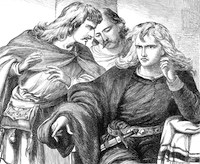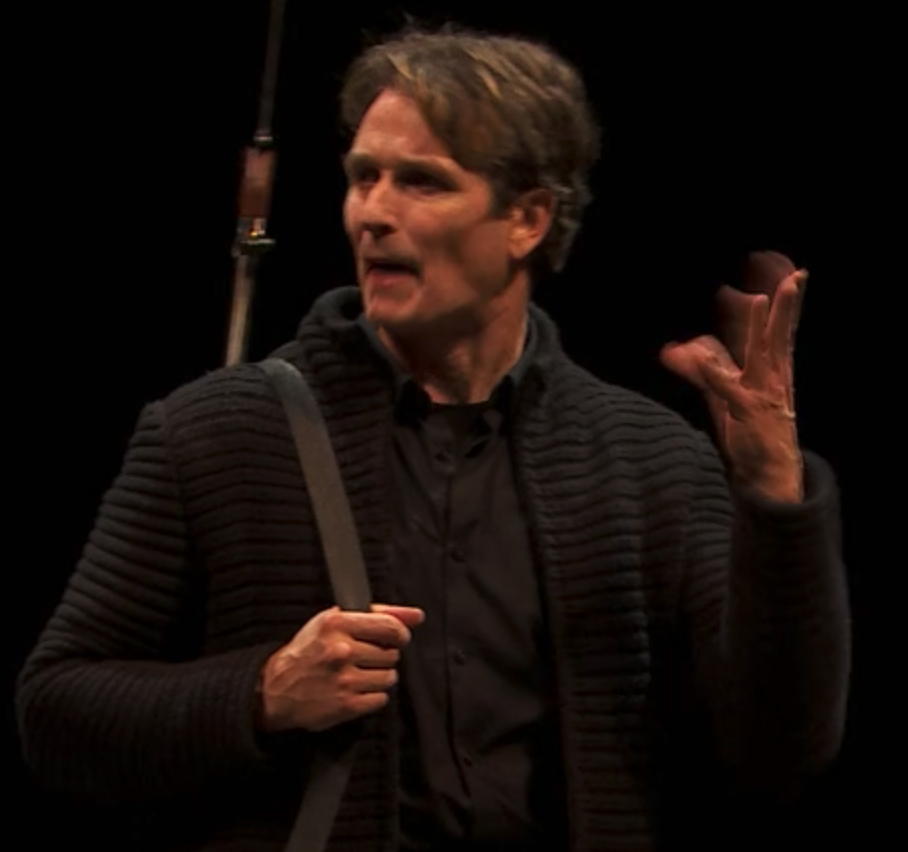Hamlet: Act 4, Scene 2
Enter HAMLET.
HAMLET
1 Safely stowed.
1. Safely stowed: Apparently Hamlet is congratulating himself on hiding Polonius' corpse in a safe place.
ROSENCRANTZ and GUILDENSTERN (Within.)
2 Hamlet! Lord Hamlet!
HAMLET
3 What noise? who calls on Hamlet?
4 O, here they come. Enter ROSENCRANTZ and GUILDENSTERN.
ROSENCRANTZ
5 What have you done, my lord, with the dead body?
HAMLET
6 Compounded it with dust, whereto 'tis kin.
ROSENCRANTZ
7 Tell us where 'tis, that we may take it thence
8 And bear it to the chapel.
HAMLET
9 Do not believe it.
ROSENCRANTZ
10 Believe what?
HAMLET
11 That I can keep your counsel and not mine own.
11. counsel: secrets.
12 Besides, to be demanded of a sponge! what
12. demanded of: questioned by.
13 replication should be made by the son of a king?
13. replication: reply.
ROSENCRANTZ
14 Take you me for a sponge, my lord?
HAMLET
15 Ay, sir, that soaks up the king's countenance, his
15. countenance: favor.
16 rewards, his authorities. But such officers do the
17 king best service in the end: he keeps them, like
18 an ape, in the corner of his jaw; first mouthed, to
19 be last swallowed: when he needs what you have
20 gleaned, it is but squeezing you, and, sponge, you
21 shall be dry again.
ROSENCRANTZ
22 I understand you not, my lord.
HAMLET
23 I am glad of it: a knavish speech sleeps in a
23. a knavish speech sleeps in a foolish ear: i.e., an insulting comment will provoke no response from a fool too stupid to understand the insult.
24 foolish ear.
ROSENCRANTZ
25 My lord, you must tell us where the body is, and go
26 with us to the king.
HAMLET
27 The body is with the king, but the king is not with
28 the body. The king is a thing—
27-28. The body . . . the body: This an echo of a statement of the legal doctrine that kingly authority does not die when a particular king dies. Hamlet is mocking Rosencrantz's question about Polonius' body, and he is also implying that the current king, Claudius, does not embody true kingship.
GUILDENSTERN
29 A thing, my lord!
HAMLET
30 Of nothing: bring me to him. Hide fox, and all after.
30. Hide fox, and all after.: Probably a cry in some game resembling hide-and-seek. Hamlet, after saying "bring me to him," suddenly changes his mind and runs away.
Exeunt.

